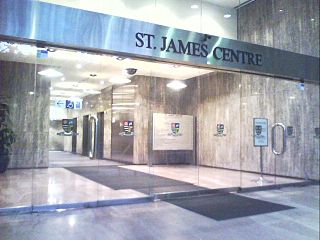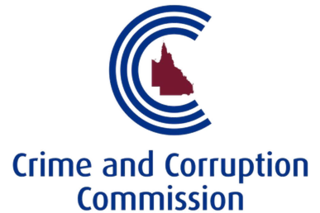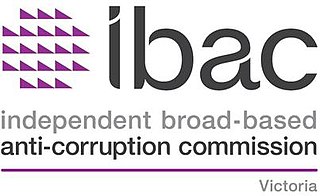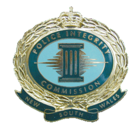
The Independent Commission Against Corruption (ICAC), an independent agency of the Government of New South Wales, is responsible for eliminating and investigating corrupt activities and enhancing the integrity of the public administration in the state of New South Wales, Australia. The Commission was established in 1989, pursuant to the Independent Commission Against Corruption Act, 1988 (NSW), modeled after the ICAC in Hong Kong.

The Royal Commission into the New South Wales Police Service, also known as the Wood Royal Commission was a royal commission held in the State of New South Wales, Australia between 1995 and 1997. The Royal Commissioner was Justice James Roland Wood. The terms of reference were to determine the existence and extent of corruption within the New South Wales Police; specifically, it sought to determine whether corruption and misconduct were "systemic and entrenched" within the service, and to advise on the process to address such a problem.

The Independent Police Complaints Commission (IPCC) was a non-departmental public body in England and Wales responsible for overseeing the system for handling complaints made against police forces in England and Wales.
The Australian Intelligence Community (AIC) and the National Intelligence Community (NIC) or National Security Community of the Australian Government are the collectives of statutory intelligence agencies, policy departments, and other government agencies concerned with protecting and advancing the national security and national interests of the Commonwealth of Australia. The intelligence and security agencies of the Australian Government have evolved since the Second World War and the Cold War and saw transformation and expansion during the Global War on Terrorism with military deployments in Afghanistan, Iraq and against ISIS in Syria. Key international and national security issues for the Australian Intelligence Community include terrorism and violent extremism, cybersecurity, transnational crime, the rise of China, and Pacific regional security.

Andrew Arnold Tink AM is a former Australian politician, having served as a member of the New South Wales Legislative Assembly for the Liberal Party from 1988 to 2007. He was in the shadow cabinet from 1995 until March 2006. He has written two political biographies, a third book on the events and political consequences of a fatal plane crash, a fourth on Australian history, culture and society in the 20th century and a fifth on the involvement of Honeysuckle Creek Tracking Station in the first moon landing. Since leaving politics, Tink has been appointed a visiting fellow and adjunct professor at Macquarie University, as a trustee of the Historic Houses Trust of New South Wales and President of the Library Council of New South Wales. He is an honorary Doctor of Letters honoris causa from Macquarie University.
The Office of Police Integrity (OPI) was the Australian state of Victoria independent police oversight and anti-corruption agency established by the Victorian Government in November 2004. OPI ceased operation on 9 February 2013 and was replaced by the Independent Broad-based Anti-corruption Commission (IBAC). OPI's official role was to detect, investigate and prevent police corruption and serious misconduct and to ensure that police members had regard to the human rights set out in the Victorian Charter of Human Rights and Responsibilities.

The Corruption and Crime Commission is an independent anti-corruption agency established on 1 January 2004 to improve the integrity of the Western Australian public sector and investigate allegations of misconduct against public officers. It took over from the Anti-Corruption Commission and has jurisdiction over all State Government departments, instrumentalities and boards as well as universities and local governments. This includes more than 148,000 employees in 278 public authorities.

The Crime and Corruption Commission (CCC) is an independent Queensland Government entity created to combat and reduce the incidence of major crime and to continuously improve the integrity of, and to reduce the incidence of misconduct in, the Queensland public sector. Formerly the Crime and Misconduct Commission (CMC) 2002–2014. The CCC also has a witness protection function. The commission was established on 1 January 2002, when the former Criminal Justice Commission and the Queensland Crime Commission were merged into a single entity under the name Crime and Misconduct Commission.
The Inspector of the Police Integrity Commission was a statutory position which oversaw the Police Integrity Commission in New South Wales, a state of Australia.
The Police Tribunal of New South Wales was a tribunal established in New South Wales, a state of Australia to deal with allegations of misconduct by New South Wales Police. It was established in 1990 and abolished in 1998.
Sir Cecil Montacute 'Spike' Clothier KCB QC was a lawyer who served as a Judge of Appeal on the Isle of Man, and then as Parliamentary Commissioner for Administration and Health Service Commissioner for England, Scotland and Wales. He was later the first Chairman of the Police Complaints Authority.

The New South Wales Crime Commission is a statutory corporation of the Government of New South Wales. It is constituted by the Crime Commission Act 2012, the object of which is to reduce the incidence of organised crime and other serious crime in the state of New South Wales, Australia.
The Judicial Commission of New South Wales is an independent statutory corporation of the New South Wales Government that provides sentencing information and continuing education to and examines complaints made against judicial officers in New South Wales, Australia.

Corruption can take many forms, and can distort how public policy is made or implemented. This article discusses the responsibilities of the various agencies involved in combating corruption in Australia. While Australia is a wealthy democracy, over the decade since 2012, Australia's ranking in the Corruption Perceptions Index from Transparency International has slipped from 7th place in 2012 to 18th in 2022 on a scale where a more honest public sector receives a lower rank. Additionally, there is a public perception that corruption in Australia is increasing. All states have broad-based anti-corruption agencies.

The Independent Commission Against Corruption (ICAC) is a role associated with the South Australian Office of Public Integrity. It was established by the Government of South Australia in 2013. The Commissioner is Ann Vanstone, a former justice of the Supreme Court of South Australia.
The Surveillance Devices Act 2007 (NSW) is a piece of privacy legislation enacted by the Parliament of New South Wales the most populous state in Australia. It replaced the Listening Devices Act 1984 (NSW). The Act makes it an offence to record private conversations apart from in specific and defined circumstances. It makes provision for law enforcement officers to apply for warrants authorising the use of such devices and the circumstances in which judges of the Supreme Court of New South Wales might issue such warrants.

The Independent Broad-based Anti-corruption Commission (IBAC) is Victoria's anti-corruption agency with jurisdiction over the public sector. It does this by:
The Law Enforcement Conduct Commission is responsible for investigating allegations of serious misconduct by the NSW Police Force and NSW Crime Commission. It was established on 1 July 2017 to replace the Police Integrity Commission

The New South Wales Police Force strip search scandal refers to a policing scandal surrounding the routine and arbitrary use of strip searches by members of the New South Wales Police Force.












